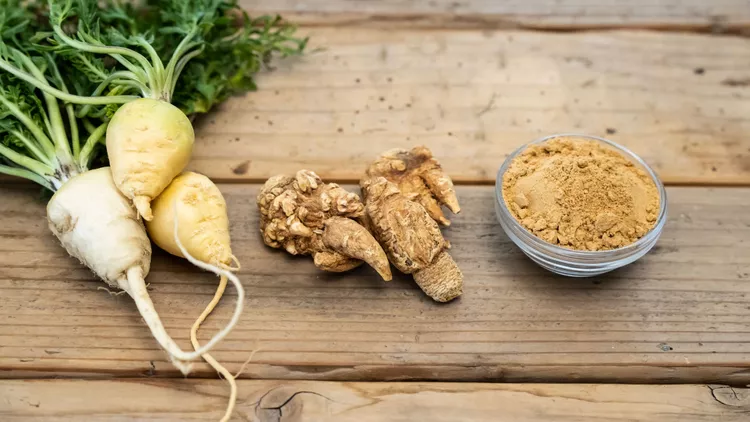If you’re keen on health trends, you might be hearing the buzz around maca root. If you haven’t, though, don’t fret: You won’t be seeing maca next to the other root vegetables in your local produce section, despite its many benefits. So, what is maca root, and how does it impact us? Where can you find it, and is it worth seeking out? Read on for everything you need to know.
What is maca root?
While some call it an herb, maca root (scientific name Lepidium meyenii) is technically a cruciferous root vegetable within the brassica family, similar to a rutabaga or a turnip. Grown at 4,000 meters above sea level, maca root is native to the Andean region of Peru, with its cultivation dating back at least 2,000 years.
Maca Root’s Nutritional Benefits
Traditionally, maca root is eaten raw, boiled, or roasted, but you’ll probably come across this healing plant in the dried and powdered form. When looking at the nutrient profile of this popular root, its benefits are undeniable. Here are just some of the nutrients that you’ll find in maca.
Protein
It may surprise you that this root vegetable is actually quite a good source of protein, which is vital for healthy muscle development and maintenance, tissue repair, and recovery from intense exercise and injury. Plus, maca is rich in many amino acids, the building blocks for protein in the body.
Fiber
Maca is also high in fiber, which is important for overall gut health, healthy digestion, and regularity. Plus, certain types of fiber feed the vital bacteria in our gut microbiome.
Vitamin C
A little less than ¼ cup of maca powder will provide a whopping 475% of your daily vitamin C needs. Vitamin C is a key player in immune health and a potent antioxidant.
B Vitamins
Maca also provides a variety of B vitamins including riboflavin, niacin, and vitamin B6. Generally, B vitamins play an important role in energy metabolism within the body.
Calcium
We’re always on the lookout for vegetarian sources of calcium, and maca is here to deliver. Calcium is vital for building and maintaining healthy bones, while also helping our nerves and muscles function properly.
Iron
Maca is full of iron, which is needed to maintain healthy red blood cells and facilitate oxygen transport throughout the body.
Potassium
Maca is a super rich source of potassium, pivotal in healthy muscle function and fluid balance throughout the body.
Copper
An often forgotten mineral, copper is also present in maca. Copper helps to ensure proper nerve function and blood cell formation, and also boosts our immune systems.
Phytochemicals
Finally, maca is also rich in bioactive plant compounds, or phytochemicals. Plant compounds take the nutrition of many plant-based foods to the next level with their antioxidant and anti-inflammatory benefits.
Should You Include Maca Root in Your Daily Routine?
So, what does the research show when it comes to the benefits maca can offer us?
Maca is full of beneficial macronutrients, vitamins, minerals, and plant compounds while being a powerful adaptogen—all benefits that improve overall health. For these reasons alone, it can certainly be a beneficial addition to your daily routine.
And one thing we do know is that maca root is an effective adaptogen. Similar to the popular adaptogenic mushroom products you see on the market these days, the adaptogens in maca help the body to respond to stress and fatigue more adeptly. Plus, on the topic of brain health, studies have found maca to have far-reaching neuroprotective properties.
When looking to integrate maca into your diet, it’s pretty unlikely that you’ll find it in its raw form, even at the best of health food specialty stores. Maca root powder, however, is quite easy to find online or in health food stores, and can easily be added to so many dishes. It tends to have a nutty, sweet taste, so it pairs nicely with sweeter dishes like smoothies, protein pancakes, energy balls, lattes, oatmeal, and healthy desserts. Though there is no official recommendation from peer-reviewed sources on how much maca to take every day, the general recommendation for supplementation is somewhere between 1,500 and 3,000 milligrams daily.
When enjoyed in moderation, maca root can absolutely be a beneficial addition to a balanced diet and lifestyle.




















